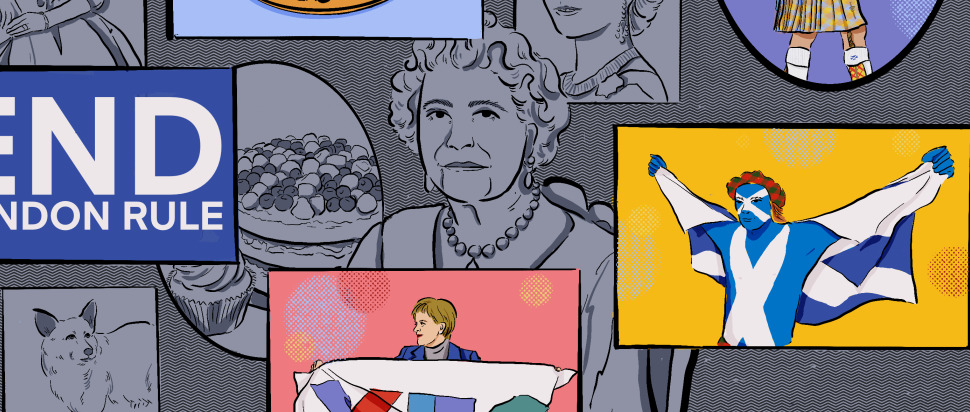Reigning in Scotland: Young Scots on the upcoming Jubilee
With the Queen’s Platinum Jubilee coming up, we talk to young Scots about abolishing the monarchy, Scottish independence, and symbols of the state
The PVC bunting seems sweaty under the June sun; the red, white, and blue icing of each celebratory cupcake sinks into the too-sweet sponge; condiments and liquors have been temporarily renamed with monarchy-inspired puns. There is something suffocating about the inescapability of the Platinum Jubilee.
It feels naïve to suggest that 2012, the year of the Diamond Jubilee, was a simpler time; but, frankly, for much of Scotland’s gen Z, it really was. Rebecca, 21, from Glasgow, was 11 at the time and spent the run up to the big day completing a Jubilee-inspired baking badge for Girlguiding, thinking little of it. The whole thing felt fairly non-monumental: “At the time, I remember thinking, ‘This is good fun – I don’t really know who the monarchy are but at least it’s getting me a day off school and free cakes.’”
For some, it was even less significant. “I don’t remember,” says Rosie, 22, from Perth. “I don’t remember because we would never talk about it or celebrate it.” Growing up, Rosie’s family were never fans of the monarchy. It’s not an uncommon feeling in Scotland and it’s only persisted in recent years: a recent poll by British Future found that only 45% in Scotland reported they wanted to keep the monarchy. In the last decade or so, the monarchy has featured heavily within the press: two royal weddings, several royal births, a sexual assault trial, and the stepping down of senior royals all while the family’s colonial ties only rust the crown further. There’s a feeling that their reign may no longer be so steady. “I couldn't care less about the Jubilee. I've got no attachment to it whatsoever,” says Rosie. “Some people are getting a day off – which is nice.”
Much of this collective apathy is rooted in the specific crises of our times. Rebecca now feels fairly unsupportive of the monarchy and the massive expense that is the Diamond Jubilee only furthers these feelings. “It's an incredible waste of money given we’re in a cost of living crisis and coming out of a pandemic,” says Rebecca. Herself and many of her loved ones are currently on minimum wage: “We’re all working our arses off just to make ends meet.” The event only further highlights Tory Britain’s ever widening wealth gap. Rosie echoes these concerns, noting the class hierarchy the institution perpetuates.
“It's dystopian. It feels very Hunger Games to me, that they're willing to put that display of wealth so publicly on show when there's so many people suffering,” Rebecca continues. Coming of age alongside the surge in the 2010s teen dystopian genre, it’s unsurprising that Rebecca draws these parallels. Right now, however, there seems little sign of anything close to the genre’s characteristic dramatic uprisings.
“It’s a very long process to get rid of a head of state. I don’t imagine it happening anytime soon,” says Rosie. While Barbados removed the queen as head of state in 2021 and Jamaica has recently begun the process, it looks unlikely in the UK. Only earlier this year, the SNP Westminster leader, Ian Blackford, stated that the queen would remain head of state in an independent Scotland.
Like many young people in Scotland, Rebecca and Rosie are in favour of independence; for both of them, this remains true regardless of the Queen’s position. However, independence ought to bring certain changes with it. “If the Queen was to be head of state in an independent Scotland,” says Rebecca, “I would absolutely expect there to be a complete strip back of the amount of money that they take from the general public for their own gain.”
The issue transcends finances: it’s also a matter of ideology. “I don't think we need a queen,” Rebecca continues. “Scotland doesn't need to hold on to any British symbols that are just that at the end of the day – symbols of wealth and status, flaunted in the face of a struggling general public.” This heavy symbol – of corruption, colonial power, and mass wealth – is looking increasingly unappealing to Scotland’s young people. But Scotland’s past is a partially British past; a British symbol is, in many ways, a Scottish one. Letting go of the ideological weight of that symbol is complex.
Detaching from the union is certainly a lot more straightforward when little thought is spared for the preservation of some grand legacy. “I think it becomes easier to be pro-independence if you don't have that feeling towards the idea of the ‘Queen of Great Britain’,” says Rosie. “I don't really feel particularly nostalgic towards that idea at all.” Seemingly, the monarchy already feels somewhat past-tense.
Instead, Scotland’s young people are looking towards the country’s future. While the Platinum Jubilee may be celebrated with a union-jacked long weekend, young Scots will largely be opting out of the celebrations and all that they represent.
